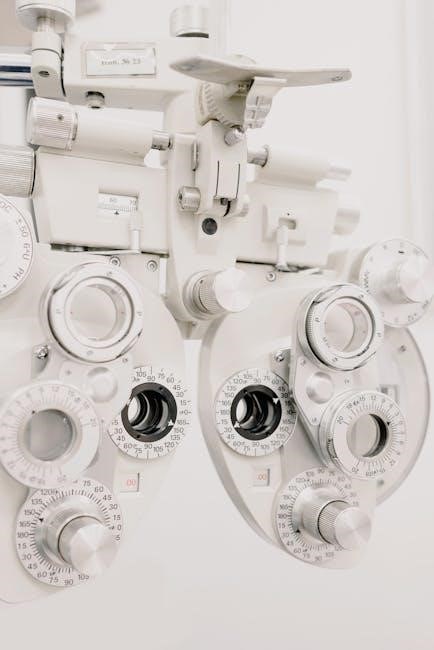dial-4 assessment pdf
The DIAL-4 Assessment is a developmental screening tool for young children, evaluating motor, conceptual, and psychosocial skills to identify those needing further evaluation or support․
Overview of the DIAL-4 Assessment
The DIAL-4 Assessment is a comprehensive developmental screening tool designed for young children, typically aged 2 to 6 years․ It evaluates three primary domains: motor skills, conceptual and academic abilities, and psychosocial behavior․ The assessment is individually administered, making it suitable for identifying children who may require additional support or further evaluation․ By focusing on key developmental milestones, the DIAL-4 helps educators and parents understand a child’s readiness for academic success․ It is not a diagnostic tool but rather a screener to highlight areas where a child may need targeted intervention․ This approach ensures early identification of potential delays, enabling timely and effective support strategies to be implemented․
Importance of the DIAL-4 in Early Childhood Development
The DIAL-4 Assessment plays a vital role in early childhood development by providing insights into a child’s developmental strengths and weaknesses․ It helps identify areas where a child may need additional support, enabling early intervention․ This tool is particularly valuable for educators and parents, as it highlights potential delays in motor, conceptual, or psychosocial skills․ By addressing these areas early, children can receive targeted interventions, improving their chances of success in school and beyond․ The DIAL-4 also supports academic readiness, ensuring children are prepared for the challenges of formal education․ Its focus on early identification and intervention makes it a cornerstone of supportive and inclusive educational practices․
Key Features and Components of the DIAL-4
The DIAL-4 offers a comprehensive assessment of key developmental skills in young children, helping educators identify those needing additional support or further testing for early intervention․
Motor Skills Assessment
The DIAL-4 assesses motor skills through tasks like skipping, jumping, cutting, and writing․ These activities evaluate both gross and fine motor abilities, providing insights into a child’s coordination and dexterity․ By observing how well a child performs these actions, educators can identify potential delays in motor development․ This section is crucial for early detection of issues that may impact physical growth and academic readiness․ The motor skills assessment in DIAL-4 helps ensure children receive timely support to enhance their overall developmental progress; This tool is essential for educators and parents to address motor challenges early, fostering a strong foundation for future learning and physical activities․

Conceptual and Academic Skills Evaluation
The DIAL-4 evaluates conceptual and academic skills through tasks that assess a child’s understanding of colors, counting, and basic concepts․ These activities measure cognitive development and readiness for academic challenges․ By identifying strengths and weaknesses in these areas, educators can provide targeted support to enhance learning․ This section focuses on foundational skills crucial for school success, ensuring children are adequately prepared for future academic demands; Early detection of conceptual difficulties allows for timely interventions, promoting better educational outcomes․ The DIAL-4’s academic skills evaluation is a vital tool for educators and parents to address learning gaps and foster a strong academic foundation․
Psychosocial Behavior Observation
The DIAL-4 includes a psychosocial behavior observation component to assess a child’s social, emotional, and behavioral development․ This section evaluates how a child interacts with others, manages emotions, and demonstrates self-control․ Observations are made during the screening process, focusing on behaviors such as cooperation, communication, and problem-solving skills․ The results help identify if a child may need additional support in these areas․ By monitoring psychosocial behaviors, educators and parents can address potential challenges early, fostering healthy emotional and social growth․ This component is essential for understanding a child’s overall developmental profile and ensuring they receive appropriate guidance or interventions to thrive socially and emotionally․
Administering the DIAL-4 Assessment
The DIAL-4 assessment is administered to children aged 2–6 years, evaluating motor, conceptual, and psychosocial skills to identify those needing further evaluation or support․
Preparation and Setup
Preparation for the DIAL-4 assessment involves creating a quiet, child-friendly environment to ensure the child feels comfortable and focused․ The administrator should gather all necessary materials, such as paper, crayons, scissors, and manipulatives, beforehand․ Reviewing the assessment manual and familiarizing oneself with the test items is essential to ensure smooth administration․ The child should be seated in a well-lit area with minimal distractions․ Establishing rapport with the child through simple conversation or playful interactions can help reduce anxiety․ Additionally, reviewing the child’s background information, such as age and developmental history, is crucial for accurate assessment․ Proper setup ensures the screening process is efficient and yields reliable results․
Conducting the Screening
Conducting the DIAL-4 screening involves administering a series of tasks that assess motor, conceptual, and psychosocial skills․ The assessment is individually administered, ensuring the child’s full attention and engagement․ Tasks include drawing shapes, cutting paper, identifying colors, and demonstrating motor skills like jumping or skipping․ The administrator observes and records the child’s performance, noting accuracy, completeness, and behavior․ The screening is designed to be interactive and child-friendly, with clear instructions to keep the child motivated․ Timing is flexible, allowing the administrator to adapt to the child’s pace while maintaining the test’s integrity․ Observing psychosocial behaviors, such as cooperation and focus, is also critical for a comprehensive evaluation․ The goal is to gather accurate and reliable data to inform next steps in the child’s development․
Scoring and Interpretation of Results
Scoring the DIAL-4 involves comparing the child’s performance to established norms for their age group․ Results are categorized as “on track,” “at risk,” or “needs further evaluation․” Each domain—motor, conceptual, and psychosocial—is scored separately to identify strengths and weaknesses․ The assessment provides clear guidelines for interpreting scores, helping professionals determine whether additional testing or support is necessary․ The results are summarized in a report that highlights areas of concern and offers recommendations for targeted interventions․ This data is invaluable for educators, parents, and specialists to guide decision-making and ensure the child receives appropriate support․ Accurate interpretation of DIAL-4 results is essential for developing effective strategies to promote the child’s developmental progress․

Understanding the Results of the DIAL-4
The DIAL-4 results help identify a child’s developmental status, highlighting strengths and weaknesses across motor, conceptual, and psychosocial domains․ Results are categorized to guide appropriate support and interventions․
Identifying Developmental Strengths and Weaknesses
The DIAL-4 assessment provides a comprehensive evaluation of a child’s developmental abilities, pinpointing both strengths and areas needing improvement․ By examining motor, conceptual, and psychosocial domains, the tool highlights where a child excels, such as strong fine motor skills or advanced problem-solving abilities․ Conversely, it identifies weaknesses, like delays in language development or difficulties with social interactions․ The results categorize children as “on track,” “at risk,” or “delayed,” offering clear insights for parents and educators․ This detailed breakdown enables tailored support strategies, ensuring interventions address specific needs while fostering growth in all developmental areas․ The DIAL-4’s clarity helps guide decision-making for further assessments or targeted interventions, promoting overall child development․

Referral for Further Evaluation or Support
Children identified as “at risk” or “delayed” through the DIAL-4 assessment are typically referred for further evaluation or support․ This process ensures early intervention and tailored assistance․ Referrals are based on specific criteria, such as significant delays in motor, conceptual, or psychosocial skills․ Parents and educators collaborate to determine the next steps, which may include comprehensive assessments by psychologists, speech therapists, or occupational therapists․ Early referrals help address developmental challenges promptly, optimizing the child’s potential for growth․ The DIAL-4 serves as a critical tool in connecting children with necessary resources, fostering a supportive environment for their overall development and future success․ Timely referrals are essential for ensuring children receive the help they need to thrive academically and socially․

Using DIAL-4 Results to Support Development
DIAL-4 results guide the creation of targeted intervention strategies and allow for ongoing monitoring of progress, ensuring tailored support for each child’s developmental needs․
Developing Targeted Intervention Strategies
The DIAL-4 assessment provides clear insights into a child’s developmental strengths and weaknesses, enabling educators to develop tailored intervention strategies․ These strategies are designed to address specific skill gaps identified during the screening process․ For instance, if a child shows delays in motor skills, activities such as targeted fine motor exercises or gross motor play can be incorporated into their daily routines․ Similarly, for conceptual or academic challenges, educators can create personalized learning plans to enhance understanding and mastery of key concepts․ The results also allow for the alignment of interventions with broader educational goals, ensuring a cohesive approach to the child’s development․ By focusing on areas of need, these strategies help children build foundational skills and improve their readiness for future academic success․
Monitoring Progress and Adjusting Support
Monitoring progress is a critical step after administering the DIAL-4 assessment, allowing educators and parents to track a child’s developmental growth over time․ By regularly assessing motor, conceptual, and psychosocial skills, professionals can identify improvements or persistent challenges․ This ongoing process ensures that support strategies remain effective and relevant․ Adjustments to interventions are made based on the child’s response to initial support, ensuring a tailored approach to their needs․ Collaboration between educators and parents is essential, as consistent reinforcement across environments fosters better outcomes․ The DIAL-4 results provide a framework for continuous improvement, helping to refine support strategies and address emerging developmental needs․ Regular monitoring ensures that children receive the appropriate level of challenge and support to thrive․
The DIAL-4 assessment is a valuable tool for identifying developmental strengths and challenges, enabling early intervention and tailored support to foster a strong foundation for future success․

The Role of DIAL-4 in Enhancing Educational Outcomes
The DIAL-4 assessment plays a pivotal role in enhancing educational outcomes by providing early insights into a child’s developmental strengths and challenges․ By identifying areas where a child may need additional support, educators can implement targeted interventions to address gaps in motor, conceptual, or psychosocial skills․ This early identification ensures that children receive the necessary tools to succeed academically and socially․ The DIAL-4’s comprehensive approach allows for personalized learning plans, fostering a strong foundation for future academic success․ Its ability to detect early signs of developmental delays enables timely referrals and support services, ultimately contributing to improved educational outcomes and lifelong learning opportunities for young children․
